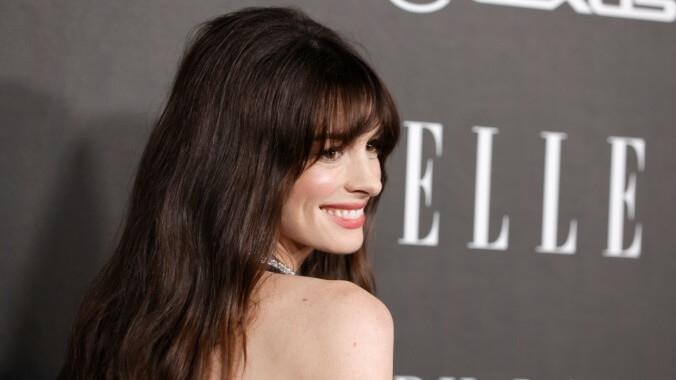Anne Hathaway reflects on all the "Hathahate" after her Oscar win
At Elle's 29th Women in Hollywood event, Hathaway looked back on the age of Peak "Hathahate," better known to some as the year 2013

Hate from a few noisy fans is one thing; a think piece in The New York Times (and in The Cut, and in The New Yorker…) examining whether or not society despises you is quite another. Unfortunately, it’s the latter sort of disdain that Anne Hathaway faced nearly a decade ago, just after winning an Oscar for her turn in Les Miserables as tragically determined mother Fantine.
During a speech at Elle’s 29th Women in Hollywood event on Tuesday, Hathaway spoke directly to the age of peak “Hathahate”—better known to some as the year 2013. The Armageddon Time star addressed her period of extreme online derision after sharing she wanted to discuss what it took to “end” her own self-hatred.
“Ten years ago, I was given an opportunity to look at the language of hatred from a new perspective,” Hathaway shares. “For context—this was a language I had employed with myself since I was 7. And when your self-inflicted pain is suddenly somehow amplified back at you at, say, the full volume of the internet… It’s a thing.”
“Full volume of the internet” is no understatement. Facing criticism for everything from her smile to her earnestness to her coiffed looks, Hathaway became a model victim of the vitriol of cool-girl feminism. She was often presented in opposition to Jennifer Lawrence, whose laid-back public persona was beloved at the onset of her stardom. (As a public-facing woman, Lawrence eventually garnered her own share of virulent, personality-based criticism as well.)
“When what happened, happened, I realized I had no desire to have anything to do with this line of energy,” Hathaway recalls. “On any level… Because there is a difference between existence and behavior. You can judge behavior. You can forgive behavior or not. But you do not have the right to judge—and especially not hate—someone for existing. And if you do, you’re not where it’s at.”
Since the “Hathahate” days, Hathaway has come back around into cultural graces (especially among the online collective in agreement that she’s been serving of late.) But that doesn’t mean her opinion on active hating has changed.
“I am of the firm belief that we are born experiencing love,” Hathaway shares. “And then we form, in a culture of misplaced hate, unhealed hurt, and the toxicity that is the byproduct of both.
She continues: “This next point is debatable, and I hope it is not offensive in its optimism, but: I believe the good news about hate being learned is that whoever learned it can learn. There is a brain there. I hope they give themselves a chance to relearn love.”